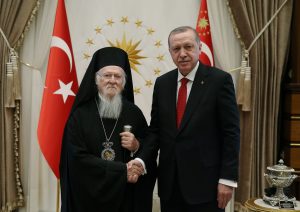WASHINGTON—Russian trolls farms linked to Yevgeny Prigozhin remain active months after the mercenary chief died in a plane crash and are likely to continue peddling disinformation aimed at influencing opinions on the war in Ukraine and the 2024 U.S. elections , according to new cybersecurity research.
Several distinct online influence campaigns with covert or financial links to the former paramilitary chief were active throughout 2023 and underwent subtle shifts in their targeting, Google’s Mandiant Intelligence unit said. The activity continued even as propaganda outfits more overtly connected to Prigozhin appeared to be dismantled by the Russian government in the wake of his August death.
The findings come as senior U.S. intelligence officials have warned that Russia and other U.S. adversaries, including China and Iran, are likely to deploy new technologies including artificial intelligence to target the 2024 presidential election with disinformation, aiming to seed doubts in the legitimacy of the results—and potentially try to affect the outcome. Senior intelligence officials have said they haven’t spotted major foreign interference attempts targeting the 2024 election yet but anticipate that several countries could seek to do so.
None of the campaigns appeared to have gained significant traction online, said John Hultquist, chief analyst at Mandiant, reflecting the difficulty Russia and others have had in matching the scale of the Kremlin’s disinformation operations seen in 2016 . But the continued activity of these groups points to Russia maintaining a capability it could increase as American elections draw closer, he said.
“We will likely see a number of threat actors target our elections and we have to take the threat seriously, but we also have to be careful not to overestimate what they can do,” Hultquist said. “It’s not easy to be an influencer.”
Prigozhin had for years been a central figure in Russia’s global disinformation operations, according to the U.S. government. The U.S. sanctioned him for his role in funding the Internet Research Agency , a troll farm that was part of what the U.S. says was a Russian disinformation campaign to interfere with the 2016 U.S. presidential election.
Later, Prigozhin, who headed the Russian mercenary firm Wagner Group, became a central figure assisting Moscow’s war in Ukraine, where his forces played a prominent role in the fighting. Following a failed coup attempt against the Kremlin , Prigozhin was killed in a plane crash that many believe was an assassination ordered by Russian President Vladimir Putin .
Prigozhin’s operations have remained actively involved in U.S. electoral politics since the 2016 presidential contest, according to U.S. officials. A heavily redacted U.S. intelligence community report on foreign influence operations during the 2022 midterms released in December said that a “Prigozhin-linked organization worked to resurface sexual assault allegations” against President Biden. Those efforts included an interview from a redacted organization tied to Prigozhin and an unidentified American. The report concluded the Kremlin and its proxies attempted to weaken the Democratic Party and undermine voter confidence ahead of the elections.
“The Russians have for years in their information operations been trying to basically discredit the legitimacy of our processes and ultimately our Democratic system,” Avril Haines , the U.S. director of national intelligence, said during congressional testimony this month. “That is one of their main objectives.”
Russian tactics have evolved since 2016 when Russia orchestrated a well-funded, multipronged online interference campaign that sought to denigrate Democratic candidate Hillary Clinton , according to disinformation researchers and Western officials. While efforts once focused largely on attracting large audiences to viral content on social-media platforms, a central focus now is creating websites that pose as legitimate news sources.
Advances in generative artificial intelligence have made writing fake articles easier than it was just a few years ago. Some newer methods also include paying unwitting actors to post misleading videos on the Cameo app that, for example, accuse Ukrainian President Volodymyr Zelensky of being a drug addict.
But traditional social media continues to remain an area of focus for Russian trolls seeking to seed inauthentic accounts on various platforms, experts say. One of the disinformation efforts tracked by Google, Newsroom for American and European Based Citizens, has kept active on social media despite having its stand-alone website taken offline following its exposure by Reuters in 2020, Google said.
A Jan. 16, 2024, post on a niche website that Google identified as tied to that group showed a U.S. state map awash in red, signifying Electoral College victories in November for Republicans except in a handful of states. An October post linked to the campaign wrote: “As long as NATO exists, there will never be peace in the world.”
Cyber Front Z, a Telegram channel, has focused its attention on promoting narratives in support of the Russian war effort and anti-Ukraine messaging, Google said. During the period between Prigozhin’s armed uprising in June and his death in August, Cyber Front Z sought to promote Wagner Group and its security role in several African countries and has continued to promote pro-Russia content related to the war since then, Google said.
Another influence outfit tracked by Google is an independent, Togo-based organization with reported financial links to Prigozhin. The organization targets African audiences in the Sahel region, especially in Burkina Faso, and demonstrated an increase in activity after Prigozhin’s downfall and death, Google said. The narratives promoted on its social channels included support for Niger’s coup last summer .
Google said it was unable to determine who has been running the Prigozhin-linked assets since he died. The Wall Street Journal reported in February that Russian intelligence agencies were peddling false narratives about American biological testing in Africa through the “African Initiative,” an online news service set up late last year whose staff have ties with the Wagner Group.
Write to Dustin Volz at dustin.volz@wsj.com


